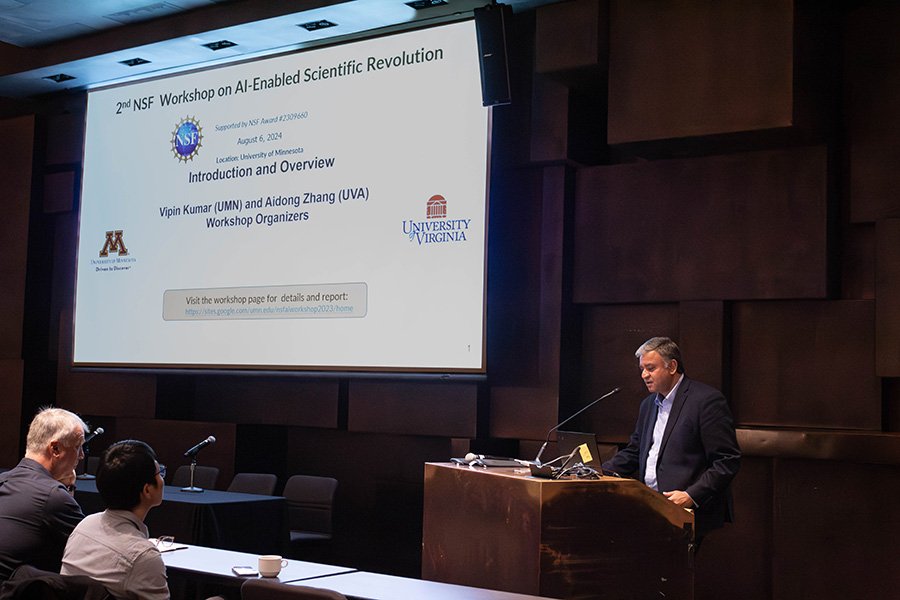UMN Hosts NSF-Sponsored Workshop on AI-Enabled Scientific Revolution

This summer, the University of Minnesota hosted two workshops focused on the role of artificial intelligence (AI) in future scientific research and discovery. Department of Computer Science & Engineering (CS&E) Regents Professor and Director of the Data Science Institute Vipin Kumar organized both workshops at the McNamara Alumni Center. On August 6, the U of M welcomed leading AI researchers from around the country for the Second National Science Foundation (NSF) Sponsored Workshop on AI-Enabled Scientific Revolution. This meeting was followed the next day with a related workshop titled, Knowledge-Guided Machine Learning (KGML): A Framework for Accelerating Scientific Discovery.
The NSF-sponsored workshop, that Kumar co-organized with Aidong Zhang from University of Virginia, was a follow up to the highly successful 2023 workshop that they co-hosted at NSF headquarters. This year’s event focused on understanding the power and limitations of recent advances in generative AI (e.g., large language models such as Chat-GPT) for accelerating scientific discovery.
U of M Vice President for Research Shashank Priya opened the session in the Johnson Great Room by highlighting the widespread enthusiasm within Minnesota industries about AI’s potential to improve productivity and the investments UMN has been making in AI and related fields.
The day consisted of lightning talks, multiple panels and lively discussions about the how generative AI is currently being used by the science and engineering communities, the limitations of existing approaches (e.g., hallucinations), ways to strengthen them (e.g., by leveraging scientific theories), and how to build a next generation ecosystem to drive innovation in this emerging area. A full report from the workshop will be published later this fall. For a full list of speakers and topics, visit the event website.
The KGML workshop took a deeper dive into the revolutionary framework that combines the latest advances in machine learning with knowledge accumulated in science and engineering fields over decades and centuries.
“The KGML framework, pioneered here at the University of Minnesota, is seeing applications across nearly all science and engineering disciplines” said Kumar. The major goal of the workshop was to explore the depth and diversity of research methodologies being explored in KGML for a wide range of scientific applications.
In addition to Kumar, the event was organized by multiple members of the CS&E community, including professor Shashi Shekar, Michael Steinbach, and alumni Xiaowei Jia and Anuj Karpatne. All talks were recorded and will be available on the event website. The event was preceded by a poster fair at the end of the NSF workshop on August 6, and featured UMN research at the intersection of AI and science and engineering.
“It was an honor to host so many renowned researchers at the University of Minnesota”, said Kumar. “Artificial intelligence and knowledge-guided machine learning have limitless potential to address global societal challenges, given their applications to all science and engineering disciplines. These workshops and resulting reports will inform the scientific agenda at the interface of AI for decades to come.”